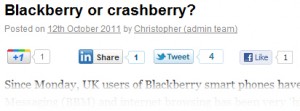This is a sponsored post. To find out more about sponsored content on Technology Bloggers, please visit our Privacy Policy.
With the availability of streaming music services like Pandora, Spotify, and Rdio all available for free and unlimited access, there are fewer people than ever actually paying for their music. According to a recent article on TechCrunch, Tom Conrad, the CTO of Pandora, said that about 50 percent of Americans don’t pay anything for music while another 40 percent only pay $15 a year for it.
If you were to walk into a big retail shop ten years ago, one of the biggest sections in the electronic media department would have been a massive collection of compact discs. Today with the likes of iPhone, and Android, CD’s have made technologies like compact discs seem old and obsolete technologies of the past.
The biggest culprit to the recording industry has been the proliferation of bit torrents and peer-to-peer piracy software. According to Torrent Freak, the Canadian Broadband Management Company says that forty percent of all internet traffic in North America comes from either Netflix or Bit Torrent. While the original intention of this sharing software was to make it easier for business to transfer important files, most of the traffic from it today comes from the illegal trade of music, television shows, and movies.
While services like Pandora, Spotify, and Rhapsody have a paid-premium option available, their free services are so convenient that there is no real reason to purchase them. Unless you want a completely advertising-free experience or simply want an unlimited data cap on what you can access per a week, the free versions of these programs work just as well and include almost all of the features. Ironically, the only companies that actually have to purchase these plans are the small retail stores that are selling you the music.
 The RIAA is having an abysmal time selling digital copies of singles and albums to consumers. Not only are the versions that are available online cheaper and make less money, they are also much easier to steal, copy, and distribute illegally over the internet. Google is partially to blame for this widespread availability of illegally traded music.
The RIAA is having an abysmal time selling digital copies of singles and albums to consumers. Not only are the versions that are available online cheaper and make less money, they are also much easier to steal, copy, and distribute illegally over the internet. Google is partially to blame for this widespread availability of illegally traded music.
According to an article in the Daily Mail, if you type in your favourite artist into a Google search, several unauthorized and pirated versions of the song will show up available for stream or download. While Google is not implicitly to blame for this, they are turning a blind eye to the practice by ranking them higher in search results.
The person who is most responsible for the digitisation of music is the late Steve Jobs. When the iPod first appeared on the market, Steve spearheaded the movement to make iTunes the ultimate way to purchase music online. In an article in the Inquirer, David Hughes (head of technology at the RIAA) claimed that Steve was a hypocrite for claiming to be a spiritual leader but not putting enough piracy protection on digital downloads.
There is no turning back from the digital way of selling and listening to music. We have come too far in our technological advances and reverting to older methods such as CD’s and cassettes would seriously hamper our tech advances.
The music industry will need to find new ways to make income such as advertising, product placement, and incorporation in order to continue to make a profit… or it could just go away and make music an art form.






